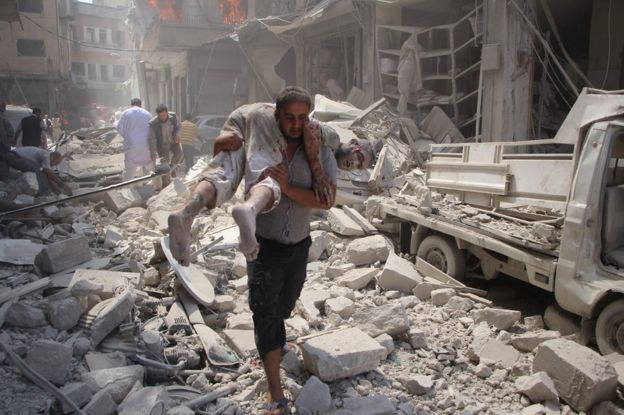Turkey has a duty to defeat the so-called Islamic State (IS) in neighbouring Syria, President Recep Tayyip Erdogan has said.
He called it a “binding duty”, to ensure the militants were “unable to carry out actions inside our country”.
Turkey’s military said its warplanes killed 20 IS fighters during air raids over Syria on Saturday.
A 10-day truce is due to start in Syria on Monday, followed by co-ordinated air strikes against jihadist militants.
The cessation of hostilities was agreed on Friday between the US and Russia, which is an ally of Syria’s President Bashar al-Assad.
Mr Erdogan said in a statement that the current Turkish military operation in Syria, known as Operation Euphrates, was just a “first step” in the fight against IS, which he calls Daesh.
“It is our duty to our people to finish off Daesh in Syria, and to bring them to a level where they can’t carry out attacks in our country,” he said.
In the same statement, he said Turkey was also determined to defeat the outlawed Kurdish Workers’ Party (PKK) and the Feto group of US-based cleric Fethullah Gulen.
Mr Erdogan has accused Mr Gulen of masterminding a failed coup attempt in July.
“We are determined to wipe out the PKK trouble from Turkey together with our security forces. Just like Feto, the PKK stands no change against our sagacious people and the power of our state.”
 The attack on Idlib also left scores wounded
The attack on Idlib also left scores woundedCountdown to ceasefire
Ahead of the ceasefire, the Syrian government has been carrying out heavy air strikes in several rebel areas, killing about 100 people.
Russian warplanes have also been in action in the provinces of Idlib and Aleppo, say Syrian activists.
Such intensification of violence has occurred before other, aborted, ceasefires in Syria, reports the BBC’s Middle East analyst Sebastian Usher.
But it will hardly persuade rebels to trust in the latest deal, which many see as simply bolstering President Assad’s position, he adds.
Iran – an ally of Mr Assad – has given a cautious welcome to the agreement.
But the foreign ministry called for a “comprehensive monitoring mechanism” to ensure it is not used by militant groups as an opportunity to restock.
The truce is due to take hold at sunset on Monday, at the start of the Muslim holiday of Eid al-Adha.
Under the plan, Syrian government forces will end combat missions in specified opposition-held areas.
Russia and the US will then establish a joint centre to combat jihadist groups, including IS and Jabhat Fateh al-Sham (known until recently as the Nusra Front).
The conflict in Syria, which began with an uprising against Mr Assad, has raged for five years and claimed the lives of more than a quarter of a million people.
Millions have fled abroad, many of them seeking asylum in the EU, but nearly 18 million people remain in Syria, which has been carved up by fighting between government and rebel forces.
If the truce holds…
 Government forces have regained ground in Aleppo
Government forces have regained ground in AleppoJihadist groups like so-called Islamic State and Jabhat Fateh al-Sham (formerly known as Nusra Front) face the joint might of the Russian and US air forces
Moderate rebels and civilians in the areas they hold will no longer face the threat of indiscriminate air strikes such as barrel-bombing although the Syrian air force will not be grounded completely; aid deliveries will be allowed to areas currently under siege
President Assad will be in a stronger position as the US and Russia engage two of his most effective military opponents while moderate rebels observe the truce with his forces
Syria’s history of failed deals
 Can Kerry (left) and Lavrov succeed at last?
Can Kerry (left) and Lavrov succeed at last?February 2012: Syrian government “categorically rejects” an Arab League plan calling for a joint Arab-UN peacekeeping mission
June 2012/January 2014/January 2016: Three failed UN-sponsored peace conferences in Geneva
September 2013: Kerry and Lavrov negotiate a deal to strip the Syrian government of its chemical weapons in return for the US backing away from air strikes. Since then, the government has again and repeatedly been accused of using toxic chemicals against rebel-held areas
February 2016: World powers agree in Munich on a nationwide “cessation of hostilities” in Syria excluding jihadist groups. There is no agreement on any joint US-Russian operations. The “pause” quickly unravels as Assad promises to regain control of the whole country
March 2016: President Vladimir Putin declares “mission accomplished” in Syria and orders removal of “main part” of Russia’s air army in Syria. Russian air strikes have continued ever since.
BBC
 Q FM Africa's Modern Radio
Q FM Africa's Modern Radio